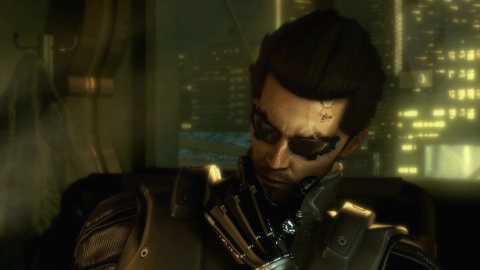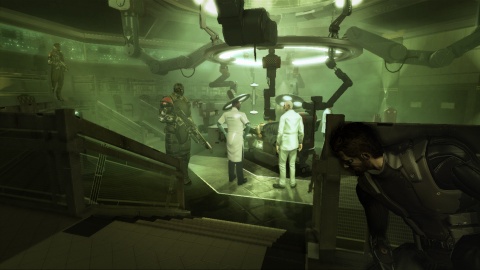Deus Ex: Human Revolution
| Deus Ex: Human Revolution | |
|---|---|
 |
|
| Platforms | Xbox 360, PlayStation 3, Windows |
| Genre | Sneak first RPG |
| Score | 7  |
| Buy from Amazon | |
Evidently, I’ve been coddled by stealth-based videogames for far too long. Metal Gear Solid gives players a large radar on their HUD showcasing soldiers’ cones of vision, allowing me to know just how far they saw and when to make my move; it only jammed now and then, leaving Solid Snake feeling clothed yet naked, but otherwise the radar remained a constant and vital companion during the fall of FOXHOUND. The Tenchu franchised handed out safe rooftops like candy. The Sly Cooper games, no matter what locale, always offered a number of places to hide or grapple on or tip-toe across; it also taught me how to pickpocket with a cane. Assassin’s Creed: Brotherhood had so many ways to hide and blend in with the public that it almost seemed like the point of the game was to be a commoner and not a kick-ass, hidden blade-wielding Casanova—actually, that’s how their online multiplayer does it. Sneaking through the massive cities was never terribly tricky, and if you messed up, there always seemed to be a way to quickly erase your footprints and try again. While certainly some skill is needed, most videogames involving stealth are pretty forgiving.
But then came Deus Ex: Human Revolution, a game I tried to play stealthily, but failed miserably, eventually throwing in the towel and just shooting enemies until they breathed no more. The first hour should’ve been a clear indication of what was to come, but I’m stubborn and continued to drop Praxis point after Praxis point into perks like “see through walls” and “hack computers up to level 5.” No points were ever devoted to fixing Jensen’s shooting ability or giving him more backpack space. All I needed—or so I thought—was my tranquilizer rifle, some darts, and the smarts to crack every keypad and computer this side of future Detroit. Turns out, I needed a lot more than that.
It’s 2027, and human augmentation is running rampant, dividing the people. Some believe it’s vital for survival and their right to tweak evolution, and others think humans have no reason playing God. Adam Jensen, head of security at Sarif Industries, a company manufacturing and developing these reality-changing augmentations, did not have a choice—he was heavily augmented in order to save his life; he nearly bought the farm when a terrorist group broke into Sarif Industries and kidnapped a team of scientists on the verge of a great discovery. Six months later, he’s alive and moving again. Curiosity is also calling. Who were those super-soldiers that attacked? What happened to his friend Megan Reed? How is it possible to still be human with so many internal technological changes? Naturally, he uncovers a lot more than expected as he globe-trots for answers.
For those that have never played a Deus Ex game before—and shame on you for at least not giving Deus Ex: The Conspiracy’s opening level a go—gameplay is a mixed bag. There’s dialogue trees, stealth elements, gunplay, inventory organizing, melee weaponry and grenades, exploration, hacking computers for emails, and other tidbits. EXP is earned by doing all these things, with bonus points rewarded for completing missions without killing anyone. When you level up in Deus Ex: Human Revolution, Jensen earns a Praxis point, which can be spent on upgrading augmentations, such as expanding your inventory, letting you pick up heavier objects, turning invisible, and falling from any height without getting hurt. These help shape your Jensen to the style of play you prefer, and there’s definitely more augmentations available for a stealthy playthrough than a straightforward run-n-gun.
Visually, the game is very pretty, even for a future where poverty is prominent. Deus Ex: Human Revolution’s palette focuses on gold and black, creating eye-catching imagery. Items you can interact with truly pop off the screen. A club called The Hive uses this honeycomb-like design to their benefit. Locations vary from city streets to warehouses to high-level media conglomerate office, and from what I can tell, it all looks different. I’m used to rooms repeating from Fallout 3 and Fallout: New Vegas. However, facial animations—especially after the phenomenal L.A. Noire—are outdated and stiff, and the game suffers from tiny text syndrome on any TV not made within the last year or so, making pocket secretaries and emails hard to read. Also, the game’s map is just plain junk.
Variety is the spice of life, and missions in Deus Ex: Human Revolution can be tackled in a number of ways. For example, there’s a warehouse of enemy soldiers holding hostages. You can either go in through the front door, fighting with all you have, or you can find an alternate entrance. Maybe a vent around back or a ladder up to the building’s roof. You can save those hostages or leave them behind. You can kill every soldier for behaving badly or kill half and knock out the rest or simply kill the ones that look at Jensen funny. Your call, really. The only time you don’t get to make a choice is, unfortunately, during the game’s now infamous boss battles. There’s three of them (and a final end boss, which is to be expected), and they’re all horrible feats of design. To progress, you have to defeat all of these bosses, and there’s no stealthy way to do so. Instead, you’re going to have to shoot them, or throw exploding barrels at them, or punch their lights out with a lucky swing. It’s frustrating for players that have devoted their entire playtime up to this on tactics that don’t require being violent and have to quickly adapt or reload an older save.
Another problem I had with Deus Ex: Human Revolution was that our leading lad Jensen’s a bit bland. Not just in looks, too—he kind of resembles Mr. Anderson, a.k.a. Neo, from The Matrix, but with niftier sunglasses—but also in his personality. Every line of dialogue is growled, giving us no distinction between surprise and anger and revelation. I found him to be just a vehicle to drive the game forward, and while he’s looking for a lost friend, never got the sense that he actually cared if she was found or not. I have to wonder if he was always like this or his de-humanizing of one too many augmentations turned him void. He’s supposed to be the one and only, the human with augmentations and no side effects, the perfect representation of future life –and I don’t want to be anything like him.
Overall: 7
Deus Ex: Human Revolution is a good game, but loses points for lame boss fights, severely weak AI, long stretches of loading, and an unlovable main character. Fun comes from solving a mission your way and exploring the levels for all the little attention to details, such as spilled coffee or newspapers or office bulletin boards. If you’re a fan of the franchise, it’s definitely a recommendation, but one with a small caveat for stealthy players—always carry a lethal weapon and put some Praxis points into your dermal armor skin augmentation. Otherwise, it wasn’t exactly what I wanted, but I do plan to play through it a second time, shooting first and asking questions second. Maybe it’ll be more enjoyable then.


